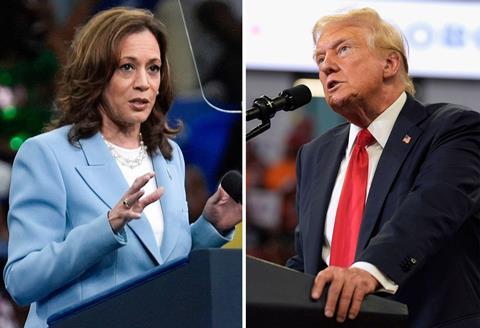The US election is just weeks away, but new research suggests at least 32 million Christians won’t be voting. Tim Farron makes the case for why believers should engage in the democratic process

The US presidential election is a fortnight away, and many of us in the UK are closely following the contest between Donald Trump and Kamala Harris. America exerts a huge influence on the world stage, and so the choice of the next White House incumbent matters to us all.
Of course, most of us on this side of the pond cannot vote. But new research by the Cultural Research Center at Arizona Christian University has found that up to 32 million church-going Christians in the US are not intending to use their vote, either.
This rises to a possible 104 million self-identified “people of faith” who are planning to sit on their hands when their country goes to the polls on 5 November. With a voting age population of 268 million, the research forecasts an overall turnout of around 55 per cent. For comparison, turnout at this year’s UK general election in July was just under 60 per cent.
Turned off by tribalism
Why don’t people want to vote? Two thirds of the survey respondents said they had no interest in politics, while 57 per cent said they disliked both major candidates. Half said that the election had become too controversial for their liking.
Be very wary of ideologies such as Christian nationalism
I would encourage Christians to vote in every election. But, in the UK, we generally have a range of candidates to choose from. The US debate has become hugely divisive, and many Christians are turned off by either the personal qualities or policy positions of both candidates.
What are we voting for?
So, do we still have a responsibility to vote if we can’t stomach either of the available options? When considering this question, it helps to step back and ask ourselves: What should we expect from our government?
Psalm 72 is a prayer for a righteous king. It tells us we should expect our rulers to carry out justice and keep the peace, to “defend the afflicted” and “deliver the needy who cry out”.
Paul reminds us in Romans 13 of the limits of these powers: “The one in authority is God’s servant for your good” (v4).
Our leaders are accountable to God for their actions, whether they recognise this or not. They hold their authority under him, and not because of their own abilities or importance.
Romans 13 also says that we should accept the authority of our human leaders - but we must not place our ultimate trust in them to solve all our problems or offer salvation from evil. Only Christ can do this. So, we need to be very wary of ideologies such as Christian nationalism that blur the distinction between Christ’s role and that of our earthly rulers.
Election results can make us feel triumphant or despairing. But the Bible tells us that they are all temporary, and that Jesus has won the ultimate victory.
If we keep this truth in mind, it will change the way we view elections. We should still be concerned about potential abuses of power, or the implementation of harmful laws, and we should pray earnestly for good, wise leaders. But we don’t need to panic about the result.
Engaging for good
From this perspective, I would still urge every Christian to use their vote. Elections are an opportunity to exercise our God-given judgement and vote for the candidate we believe will best make decisions to benefit the whole of society.
These choices are not easy, but if we don’t vote, our abstention is itself – in the words of my friend Michael Wear – a choice “about how to steward the responsibility [we] have been given”. If half of eligible voters do not turn out, this will absolutely affect the final result.
Voting is only one aspect of our democratic involvement. Between elections we should pray about politics, take action to meet the needs of others and campaign against injustice.
Our leaders are accountable to God for their actions, whether they recognise this or not
We should also hold our leaders to account if they misuse their authority. In their book, Jesus and the Powers (SPCK) Tom Wright and Michael Bird conclude that it is possible for government to forfeit its authority if it acts with cruelty, greed or injustice.
However, they emphasise that “obedience and respect for government is the norm even if the government is imperfect or unjust in some matters. Civil disobedience is reserved for unjust laws, and uncivil disobedience should be reserved only for violent authoritarians.”
No matter what seismic shifts our elections may produce, God calls us to live under the authority of government by putting our faith, hope and trust in Jesus, by reflecting his love into our society and being distinctly different to those around us.





































2 Readers' comments